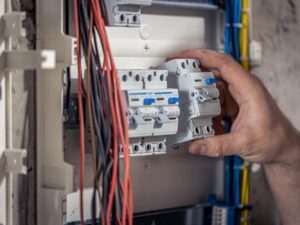When it comes to electrical jobs, residential and commercial projects have key differences. Although wiring may seem similar, not all electricians are trained to handle both types. The size and complexity of the jobs vary, and so do the electrical systems involved.
What’s the Difference Between Commercial and Residential Wiring?
Commercial wiring is designed for businesses, schools, hotels, co-living spaces and mixed-use facilities. In contrast, residential wiring is meant for homes and apartments. Commercial jobs are often more complex, with higher electrical demands and larger electrical panels. This complexity is particularly evident in commercial spaces like business parks, where multiple businesses may require different levels of electrical support.
Wiring Types and Power Phases
The installation methods also differ between residential and commercial buildings. Commercial buildings typically use tube-like conduits for electrical protection, while residential wiring often uses plastic sheathing around thin wires. Although conduits are rare in residential settings, they may be necessary in some cases.
Another key difference is in the power supply. Residential wiring usually operates on single-phase power, while commercial electricians work with three-phase power, which supplies significantly more electricity.
In commercial settings, the range of electrical needs is vast. Hospitals rely on specialized medical equipment, factories operate heavy machinery, and food distribution facilities depend on reliable refrigeration. Each of these environments has specific electrical requirements to ensure safety and efficiency.
Choosing the Right Electrician for Your Project
When hiring an electrician, consider the type of property involved. Residential electricians focus on homeowners and their specific needs. In contrast, commercial or industrial electricians work with contractors and architects on large-scale projects, often requiring detailed blueprints for electrical installations. Residential electricians typically do not handle these larger tasks, although they must still meet safety codes.
Electricity powers our world, and we’re here to keep you connected! If you need reliable and experienced electrical contractors for your commercial or residential project, look no further than Prairie Electric. Our design-build experts ensure that your electrical systems meet your needs, whether for new construction or upgrades.
In addition to new builds, we offer a range of repair and re-wiring services for homes and facilities. We also create custom-designed panels for specialized applications in aerospace, medical, and military fields. Have an idea for improving efficiency in your plant? Contact us today to learn how we can assist you!


